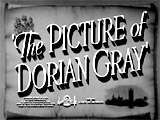
|
The Picture of Dorian Gray
(1945)
In writer-director Albert Lewin's black and white
occult-horror fantasy drama based upon Oscar Wilde's story about
a man's soul and its evil destiny - the Faustian themed tale told
about the fate of a healthy, handsome, and young 19th century Victorian
Englishman who bargained with his life:
- the film's opening quote from The Rubaiyat of
Omar Khayyam: "I sent my soul through the invisible,
Some letter of that after-life to spell; And by and by my soul
returned to me, And answered, 'I myself am Heaven and Hell'"
- in London (1886), young 22 year-old
aristocrat Dorian Gray (Hurd Hatfield) was influenced by the
words and urgings of cynical, dissolute and witty old acquaintance
Lord Henry Wotton (George Sanders) about yielding to life's pleasures
and becoming hedonistic in one's youth, rather than suppressing one's
desires: "There's no such thing as a good influence,
Mr. Gray. All influence is immoral...Because
the aim of life is self-development. To realize one's nature perfectly.
That's what we're here for. A man should live out his life fully
and completely, give form to every feeling, expression to every thought,
reality to every dream. Every impulse that we suppress broods in
the mind and poisons us. There's only one way to get rid of a temptation
and that's to yield to it. Resist it and the soul grows sick with
longing for the things it has forbidden to itself. There is nothing
that can cure the soul but the senses. Just as there is nothing that
can cure the senses but the soul...What the gods give, they quickly
take away. Time is jealous of you, Mr. Gray. Don't squander the gold
of your days. Live. Let nothing be lost upon you. Be afraid of nothing.
There is such a little time that your youth will last, and you can
never get it back. As we grow older, our memories are haunted by
the exquisite temptations we hadn't the courage to yield to. The
world is yours for a season. It would be tragic if you realized too
late, as so many others do, that there is only one thing in the world
worth having, and that is youth"
- the finished painted portrait
of Dorian Gray (seen in Technicolor) was revealed to him by his painter-artist
friend Basil Hallward (Lowell Gilmore); Gray was distressed that
the painting reminded him that he would not be handsome and
youthful forever - Dorian wished for eternal youth - a Faustian bargain
- completely obsessed with remaining youthful, Dorian
Gray spoke to the painting in the presence of a statue of the ancient
Egyptian goddess Bast ("one of the 73 great gods of Egypt"),
that he would "give my soul" if he could stay young forever
and never grow old: "As I grow old, this picture will remain
always young. lf it were only the other way. lf it were I who was
always to be young, and the picture that was to grow old...I know
now that when one loses one's youth, one loses everything...lf only
the picture could change, and I could be always what I am now. For
that I would give everything. Yes, there's nothing in the whole world
I would not give. I would give my soul for that"; in the bargain,
while he remained young-looking, the figure in the painting would take
on all of the decaying and corruptive qualities that came with aging
- the wish appeared to come true, as the painting slowly
aged (locked away in an attic room), while Gray remained youthful
- Dorian Gray began to exhibit
many misdeeds, beginning with his intense love affair with singer
Sibyl Vane (Angela Lansbury), the daughter of a tavern owner, whom
he met at the Two Turtles Pub; she had a knightly-name for him "Sir
Tristan"; but then he abruptly rejected his fiancee Sibyl, sent
her a hurtful and demeaning letter (and some cash as compensation): "You
have killed my love. You have been false, not to me, but to the ideal
I had formed of you. You used to stir my imagination. Now you are
nothing to me. I will never see you again. I will never mention your
name. I will never think of you. Henceforth, I shall live only for
pleasure. Everything else is meaningless. And if this leads me to
the destruction of my soul, then it is only you who are responsible...I
have been living in a land of illusions. Now, I shall make an end
of dreams. My real life begins. My own life, in which you cannot
possibly have any part"
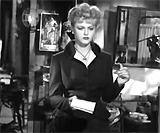
Sibyl's Reading of the Rejection Letter
|
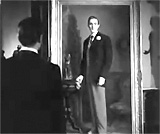
The Portrait Began to Change
|
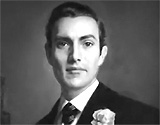
The Portrait: "The lines of cruelty about
the mouth were unmistakable"
|
- Dorian became increasingly concerned by the painting's
slow transformation as he aged (although he remained good-looking
and youthful); he also was becoming more heartless, hedonistic,
narcissistic, ruthless, mean and sinful - he worried that the painting
changed after breaking off his engagement to Sibyl: "ln the
dim, shaded light, the face appeared to him to be a little changed.
The expression looked somehow different. One would have said that
there was a touch of cruelty in the mouth. It was very strange.
There was no doubt that the whole expression had altered. The lines
of cruelty about the mouth were unmistakable"
- when he began to have second thoughts
(and screened off his portrait), he learned
from Lord Wotton that Sibyl had committed suicide by poison, and
thence blamed himself: "So I have murdered Sibyl Vane, as
surely as if I'd cut her throat"
- Dorian Gray locked the painting away in his school-room
attic ("The picture could be safely hidden away there")
as it began to truly reflect and reveal the nature of his soul, disclosing
his real evilness and corruptive life (including loose women, opium
dens, etc.): "Here among the innocent souvenirs of his childhood,
the hideous portrait would be forever hidden away. The face painted
in the canvas could grow bestial, sodden and unclean. No one would
ever see it. No one, except himself. He was to have eternal youth,
while the portrait bore the burden of his shame"
- years later when Dorian was 40 (although still looked
like he was 22), painter Basil demanded to see the painting locked
away in Dorian's attic - the portrait was again revealed in full
color: ("ln spite of the indescribable corruption of the portrait,
Basil was still able to recognize his painting of Dorian. It was
from within, apparently, that the foulness and horror came. It was
as if some moral leprosy were eating the thing away")
- when Basil attempted to warn Dorian and pleaded with him to reform his
life after seeing the changed portrait corrupted by secret sins,
Dorian went into a panic and murdered Basil by stabbing him to death
in the back, and then hid his body in the room with the painting;
he was able to blackmail scientist friend Allen Campbell (Douglas
Walton) into secretly disposing of the corpse; later, Campbell suicidally
killed himself in misery
- Sibyl's brother James Vane (Richard Fraser), who was
seeking revenge for the suicidal death of his sister 18 years earlier,
was accidentally shot and killed during a hunting accident, when
he was hiding in bushes during his stalking of Dorian
- Dorian became acquainted with Basil's niece Gladys
Hallward (Donna Reed), and soon seized her away from her noble suitor
David Stone (Peter Lawford); however, a stealthy Stone divulged that
he had entered Dorian's locked attic room and had seen the horrid
painting created by Gladys' uncle Basil: ("A sort of middle-aged,
mad, gruesome uncle with a debauched face and blood all over him...
the eyes shine in an evil way that's indescribable")
- during the revelation of the evil of Dorian's portrait, Gladys received
a rejection letter from Dorian himself - he claimed it would be wicked
to marry her and he would spare her by leaving her: "Once I said
that if I were to marry you, it would be an incredible wickedness.
You thought it was a way of saying that I didn't love you. You must
know that I do love you, more than anything in the world. But I can
only bring disaster on those who love me. If you knew how I've already
wronged you, you would turn from me in horror. You will never see me
again. Try to remember me, dear Gladys, without bitterness. This is
the only good thing I have ever done"
- in the concluding shocking scene, Dorian viewed
his own painting - curious to see what the effects of his behavior
had been upon it: ("Would there be any sign of his one good
deed in the portrait?"); there was a sudden and shocking
final view of the hideously-aged painted portrait of Gray (occasionally
shown in Technicolor) showing the ravages of sin and withered aging
(while he remained young, vain and handsome)
- he attempted to stab the heart of his image in the
picture (with the knife used to stab and kill Basil) to release his
awful visage and the spell that had been cast upon him, but he actually
stabbed his own heart; he collapsed to the floor ("The knife
that had killed Basil Hallward would kill his portrait also and free
him at a stroke from the evil enchantment of the past. But when the
knife pierced the heart of the portrait, an extraordinary thing happened");
he began to pray for forgiveness -- "Pray, Father, forgive me
for I have sinned. Through my fault, through my most grievous faults"
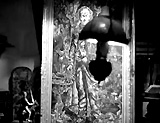
Dorian Viewed the Portrait One Last Time and Then
Stabbed Its Heart
|
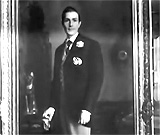
The Painted Reverted Back To Its Original
|
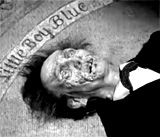
Dorian Gray Took On The Hideous Characteristics
of the Portrait
|
- as he died on the floor,
he miraculously took on the hideous and deformed characteristics
of the painting - while the painting reverted back to its original
depiction of Dorian as a young man (as a swinging lamp cast ominous
shadows); when his body was discovered, it had taken on grotesque,
monstrous features; Lord Wotton, Gladys and David burst into the
room and gasped at the sight: ("Wotton: "Heaven
forgive me. Take Gladys home, David")
|
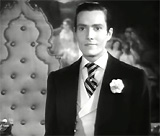
Dorian Gray (Hurd Hatfield)
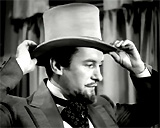
Lord Henry Wotton (George Sanders) - The Virtues of Hedonism
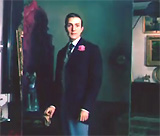
Dorian's Original Portrait (in Technicolor)
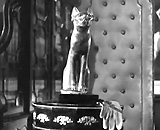
Egyptian Statue of Goddess
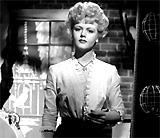
Sibyl Vane (Angela Lansbury)
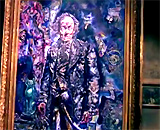
The Revelation of the Hideous Portrait in the Attic (in
Technicolor)
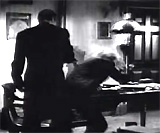
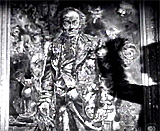
Stabbing Death of Basil by Dorian - Silhouetted Before
the Aged and Disfigured Painting
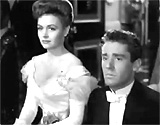
Gladys (Donna Reed) with Suitor David Stone (Peter Lawford)
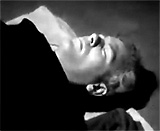
Suicidal Death of Allen Campbell
The Conclusion:
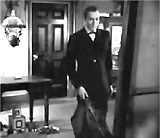
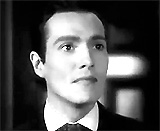
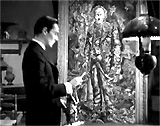
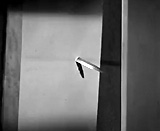
Knife Through the Heart of the Portrait (Seen From Behind)
|















